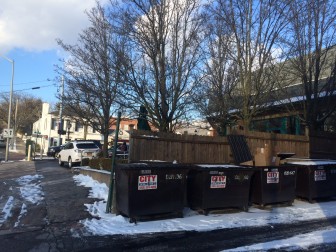Saying loose garbage bags, conspicuous dumpsters and misused trash receptacles diminish downtown New Canaan’s appearance and charm—if not its sanitation—town officials are searching for ways to help boxed-in businesses dispose of their waste more responsibly.

This row of dumpsters along the alley back of Starbucks, known as Elm Court, greets visitors disembarking from the train. Town officials for many reasons, including aesthetics, are trying to find ways to make these bins less conspicuous while getting more businesses—and particularly restaurants, with their high yield of food refuse—to use them. Credit: Michael Dinan
Off-hours visitors to downtown—and Mead Park, for that matter—misuse public garbage bins and commercial dumpsters by throwing their household trash in them, exacerbating the problem in a town that’s seen a steep rise, in recent years, in the number restaurants and attendant waste that requires hauling, officials say.
The town must “get a handle of the garbage can view as you arrive from the railroad station—that is the first thing to present itself in New Canaan,” Planning & Zoning Commissioner Laszlo Papp said at a special meeting of the Plan Implementation Committee on Jan. 7.
“That entire sidewalk and garden and everything else by Starbucks is incredibly unsightly,” he said at the meeting, held in the Training Room at the New Canaan Police Department.
The problem of conspicuous garbage and dumpster overflow in downtown New Canaan is multi-faceted, officials say.
For example, businesses often have no area around back for dumpsters—or at least no area accessible to haulers’ vehicles—which means there are limited places where restaurants, for example, can put their trash.
Space is so tight for some, in fact, that even restaurants that are required to store daily bagged trash in covered toters sometimes do not have the space to store those toters—so the bags end up on the sidewalk.
Add to that the problem of “in-town” residents who use commercial or municipal garbage receptacles to dump household waste.
P&Z Secretary Jean Grzelecki said it’s incumbent for businesses to keep the lids to those dumpsters down if not locked, and if possible, to remove the receptacles themselves to a less accessible, enclosed area.
Town Council member and New Canaan Chamber of Commerce Executive Director Tucker Murphy said at the meeting that the area behind Starbucks is “particularly bad” with “a lot of people going to get coffee and bringing their garbage with them to dump it.”
New Canaan has no municipal garbage pickup, so residents either make arrangements with a private hauler—often by entire neighborhoods, to get a better rate—or bring their household refuse to the Transfer Station.
The recently updated Plan of Conservation and Development notes “Garbage/Litter” specifically: “Management of garbage has been identified as one of the things that most affects people’s perception of downtown. New Canaan should identify a solution to this situation since litter and overflowing garbage bins detract from the downtown as much as businesses placing their garbage on the curb for pickup at the end of their business day–at the same time as people are arriving for dinner.”
The Town Code, though it spells out various parties’ responsibilities with respect to misuse of garbage bins or littering, appears not to offer up one definitive penalty or fine for such, but rather to spread the relevant language over several sections—a familiar shortcoming, perhaps, of that important document.
Most of it is contained in Chapter 25. There, the Code spells out the sanitary disposal of garbage “does not create offensive odors, invite the breeding or collection of flies, mosquitoes or rodents, create a fire hazard,” and also prohibits public dumping or “scattering of refuse.”
‘Refuse,’ ‘rubbish,’ ‘garbage’ and ‘litter’ as defined in the stormwater regulations fall under the general category of “pollutants,” and Chapter 7A dealing with blight abatement also notes that all garbage and household refuse must be stored “in garbage cans with a secure lid”—a rule which still would apply in the downtown where apartments exist above street-level shops, for example.
The Code does specify a fine of up to $25 for contractors who litter the streets or sidewalks with “dirt, dust or stones” (in the same chapter that outlaws slingshots), and makes mention that residents must clean up after themselves while picnicking, while separate town documents govern other parts of littering, such as on sidewalk cafés handling their litter.
Officials now looking at whether some areas of the downtown could be cordoned off specifically as places where dumpsters could be placed inconspicuously but not too inconveniently for businesses to dispose of their trash.